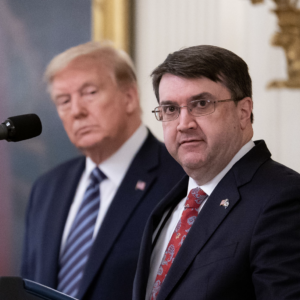Helping America win the fight against COVID-19 is the Department of Veterans Affairs’ “fourth mission,” Secretary Robert Wilkie said during a wide-ranging discussion with journalists hosted by InsideSources.
Secretary Wilkie, who currently serves in the Air Force Reserve and is the son of a Vietnam veteran, made his case for the success of VA reforms and discussed the department’s role in the fight against the coronavirus pandemic.
Here are highlights from that conversation. The questions and answers were edited for clarity.
Question: What is the “fourth mission” and how does it affect VA operations during a crisis, such as the coronavirus pandemic?
Wilkie: First, let me talk about the first three missions: They are veterans’ health, veterans’ benefits and memorial services. We also have a fourth mission and that is a national emergency mission. Responding to hurricanes, we send out nutrition trucks, we send out pharmacies, we send out clinics, we send out engineers and policemen.
The other part of this national response is in an epidemic. COVID-19 has not hit veterans hard — at least not as hard as was predicted. And we became the backstop for local communities. Once our veterans’ health mission was taken care of, we opened our doors to the community. In New Orleans, Brooklyn, Manhattan and Orange, New Jersey — those were the first four hospitals we opened to civilians in response to COVID-19 because we had more than enough capacity.
There are thousands of VA employees out in veterans homes, in community nursing homes and in hospitals. I think one of the proudest stories for this department is what’s happening in the Southwest among the Indian nations. We have nurses who are actually learning the Navajo language in order to provide better and more culturally sound medical services to Native Americans.
Q: As you know, last week, there were some documents, declassified, related to K2 and toxic conditions that service members were exposed to. Rep. Steven Lynch, who is sponsoring legislation to help these K2 veterans, said the Department of Veterans Affairs continues to deny that these health conditions are service connected.
The Department of Defense has to do the epidemiological studies to allow the veterans to get certain screenings from the VA. Have you asked Defense Secretary (Mark) Esper to order the DOD to do these, or are you going to wait until the legislation passes, which may take a year or more for these veterans while they continue to suffer?
Wilkie: Let me take a step back and say that you’re talking about two different things. First of all, we don’t deny medical services to any veteran who is sick. That’s the most important thing, even during all of the debates about benefits for Agent Orange, we were taking in thousands and thousands of Vietnam veterans who had health conditions that were later shown to be the result of Agent Orange. We do the same thing with K2.
Now, the Congress does have to change legislation when it comes to the categorization of disability benefits. The most important thing for me is making sure that if someone comes to our doors or someone comes to our clinic and is not well, we take care of them.
Q: Regarding veterans’ mental health, does the VA have enough qualified individuals to take care of those suffering with mental health issues, particularly PTSD?
Wilkie: If anything, our ability to treat mental health has gone way up in the last two years. We have same-day mental health services now — that is a sea change in the way the VA does its work. I’m very proud of our mental health services and in our treatment of addiction and our efforts on suicide.
Our veterans centers are designed to meet the needs of combat warriors — people who have heard the sound of the gun. We’re expanding the number of services that we provide in these vet centers. We’re expanding the number of people who are employed by them. I always try to visit a vet center whenever I’m out on the hustings. Can we always improve? Sure. But in terms of where we are, I believe we’re in a better position than just about any healthcare system in the country.
Q: Recent numbers released by the VA show that telemedicine has skyrocketed. Does the VA have any data on how patients are rating that experience? What are the barriers that need to be overcome to boost telemedicine even more?
Wilkie: First, the barriers that need to be overcome are our bandwidth. The majority of our veterans live in rural America. … The barrier there is making sure people can get on the internet. I can tell you — without having any metrics in front of me — the raw numbers tell us that our veterans are flocking to telehealth. In a normal month, just on the mental health side, we have about 40,000 encounters. We’re now up over 900,000 now a month, (as) we’re beginning to put mental health — or actually telehealth clinics — inside Walmarts so that we can expand our footprint in rural America.
We know that many of our veterans who need mental health services are more comfortable in the privacy of their home, with their family. Telehealth is the wave of the future.

